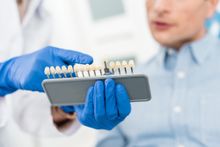
Traditional dentures are an effective way of replacing missing teeth so that you can maintain a vibrant and functional smile. But for many, these prosthetic devices may not be as secure as they’d want, as many will eventually slip or slide around after regular use. Fortunately, dentists can stabilize dentures by fixing them in place using dental implants. If you’re curious about how you can enjoy a more comfortable experience, here’s what to know about stabilization.
Why Are Stabilized Dentures Preferable?
When the prosthesis doesn’t fit securely, the movement can have a considerably negative impact on your overall quality of life. For many, improperly fit devices make it difficult to chew with confidence and may even cause swelling, discomfort, or friction wounds to the gums. Others may find that loose prosthetics can negatively affect speech, making it harder to have conversations or engage in public speaking.
What Does the Implant Process Involve?
 In order to stabilize your prosthesis, dental implants must first be properly placed. During this procedure, a dentist will surgically implant a metal post through the gum line. Over the course of several weeks, this post will heal and fuse with the jawbone to create a reliable hold.
In order to stabilize your prosthesis, dental implants must first be properly placed. During this procedure, a dentist will surgically implant a metal post through the gum line. Over the course of several weeks, this post will heal and fuse with the jawbone to create a reliable hold.
How Is an Existing Set Retrofitted?
One unique advantage of stabilization is that you can usually use the dentures you already own. To make the devices compatible, your dentist will retrofit the underside of the prosthetic by installing attachments. These attachments are hidden from view and connect with the metal post to form a solid connection.
Who Is a Candidate for Implant-Supported Dentures?
If you want to avoid the embarrassment and inconvenience that loose dentures cause, talk to a dentist to find out if you’re a candidate for stabilization. In order to qualify for the procedure, you must have a strong and healthy jawbone so that the metal post can fuse properly.
Even if you’re experiencing jawbone deterioration, there are a few ways your dentist may be able to adjust the procedure. For example, they may use a different implant—such as a clip that bends over the gum line—rather than a metal post that fuses directly into the jaw. In other cases, bone grafting may help restore the impaired portion of bone and allow for stabilization.
If you’re concerned about your dentures, Anderson Dental Group in Salisbury and Mooresville, NC, can help enhance your comfort. Offering comprehensive dentistry services, this qualified team can provide you with dental implants and modify your existing dentures to improve fit and function. Dedicated to client satisfaction, this dentist will work with you to ensure your prosthetics continue to function the way you want and protect your oral health. To learn more about their restorative services, visit this Iredell County,or Rowan County dental office online. For appointments, call a friendly team member at (704) 663-3300, or (704)636-3611.
About the Business
Have a question? Ask the experts!
Send your question

